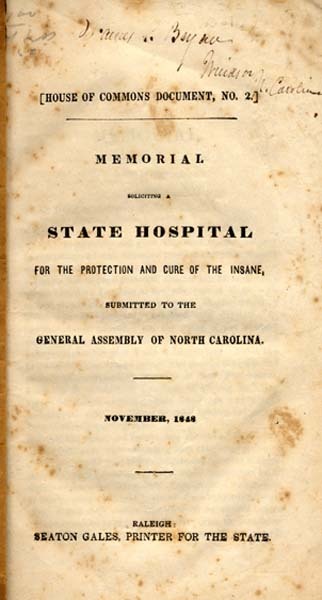Dorothea Dix and the Establishment of the North Carolina State Hospital
Dorothea Dix found an interest in reformers such as Elizabeth Fry and William Rathbone while she was ill in Greenbank, Rathbone’s mansion close to Liverpool. She had stayed here because of the close proximity to the transatlantic port from which Dix had entered Liverpool on her voyage riding The Virginian. During her stay, her interest in prison reform grew and followed her back to North America. She then was invited to teach a class of young women at the Middlesex County House of Correction in East Cambridge by John Taylor Gilman Nichols. The Middlesex County House of Correction also housed mental hospital patients that were an overflow from the state mental hospital in Worcester, providing insight into the mistreatment of these patients. She fought for them to be provided with heat, and this began her interest in the treatment and sympathy for mental health patients. Dorothea Dix subsequently visited a plethora of mental health facilities and prisons in Massachusetts in which she witnessed many mistreatments of the patients who were kept more like prisoners. Each hospital provided her with another reason to fight for these patients, while once stating, “If I fail in this work it shall be through no negligence of mine.” (Brown, 87) Keeping her promise, she wrote the Memorial to the Legislature of Massachusetts, presented by Samuel Gridley Howe on January 19, 1843, to expose her findings at prisons and hospitals and bring light on these issues for the legislature. Although this legislation ultimately failed, she was not disheartened and continued on to write the House of Commons Document, No. 2 to the state legislature of North Carolina in November of 1848. Dix describes the horrors and mistreatment she observed in each hospital, describing them as, “Deserted, oppressed, and desolate.” (Dix, 3) The document goes on to illustrate the corruption of these facilities whilst alluding to the bible, in hopes that this exposure would cause government officials to act upon these findings. Finally, Democratic Leader James C. Dobbin supported Dix’s bill and it passed, establishing the Insane Asylum of North Carolina, later renamed in tribute to Dix.
“Dorothea Lynde Dix, 1802-1887 Memorial Soliciting a State Hospital for the Protection and Cure of the Insane, Submitted to the General Assembly of North Carolina. November, 1848. [House of Commons Document, No. 2.].” Documenting the American South, docsouth.unc.edu/nc/dixdl/title.html.
Dix, Dorothea L. “Memorial to the Legislature of Massachusetts.” Disability History Museum--Memorial To The Legislature of Massachusetts, www.disabilitymuseum.org/dhm/lib/detail.html?id=737&page=all.
Brown, Thomas J. Dorothea Dix: New England Reformer. Harvard University Press, 1998.
